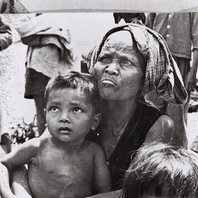“Bodies of Occupation: Monsters, Queers and Others” is an online programme of weekly seminars involving artists from all over the worlds in conversation with discussants (16 September – 28 October 2021).
Stories of foreign occupation are filled with bodies. By turns savage, “civilised”, enslaved, resisting, exploited, fetishised or “emancipated”, bodies mediate between the different forms, agencies and spaces of occupation. They are simultaneously the most public and the most intimate site of interaction between the occupier and the occupied. As such, they have attracted a great deal of attention from researchers, activists and artists. The existing literature offers a wide range of perspectives on the embodied dimensions and legacies of occupation in various arenas (law, social activities, administration, family life, education, sexuality, culture, religion, sport, etc.). Yet bodies of occupation are perhaps, first and foremost, shapeshifters. In this way, they reflect the unstable realities and perceptions of occupation itself. It is this corporeal specificity of occupation that this programme tries to unpack as it raises the questions: What body? And what occupation?
In recent years, there has been, in academic and popular circles, a rethinking of the relations between corporeality and environment. Building on these new critical perspectives, the programme proposes to look at occupation beyond the strict historical and legal definitions of the term (military operation, colonialism, imperialism, political oppression and war). Notions such as “post-anthropocentric”, “more-than-human” and “slow violence” (Rob Nixon 2011) have considerably changed our views of the temporal and spatial scales of occupation, and the way these scales are connected. In response to these developments, the programme suggests an “expanded field” of occupation that includes, amongst other things, transitional justice initiatives in post-conflict societies, the spread of “techno-fossils” and other pollutants, the neoliberal use of bodies as disposable machines, urbanisation, the “NGO-isation” of developing countries, cultural “soft power” and the everyday effect of gender, race and class normative categorisations. By inviting artists, researchers and curators to explore together the way human and nonhuman bodies exceed, rework and queer the “frames” of occupation, this series of conversations aims to contribute fresh interdisciplinary insight into old/new contact zones, transitions, grey areas and residues of occupation.
Programme and participants
Participants: Jonathan Luke Austin (University of Copenhagen), Dominic Davies (City University London), Kobi Kabalek (Penn State University), Rúben Leitão Serém (University of Nottingham), Annie Webster (King’s College London and University of Cambridge)
Discussants: Pamela Corey (Fullbright University Vietnam), Annie Jael Kwan (independent curator and researcher)
Discussants: Gaik Cheng Khoo (University of Nottingham/Malaysia), Simon Soon (University of Malaya)
Discussants: Brian Curtin (Chulalongkorn University), May Adadol Ingawanij (University of Westminster)
Nontawat Numbenchapol’s movie Boundary (2013) will be accessible online on 5 October for 48 hours.
Discussant: Zuzanna Dziuban (Austrian Academy of Science)
Discussant: Russ Skelchy
Angela Seo’s piece will be available online on 14 October for 48 hours.
Discussants: Joanna Allan (University of Northumbria), Omar Berrada (writer and curator), Sébastien Boulay (University of Paris), Taous Dahmani (researcher and curator)
Discussants: Ariadne Collins (University of St Andrews), Theo Reeves-Evison (Birmingham School of Art) [tbc]
